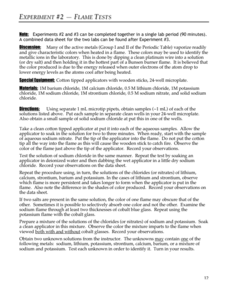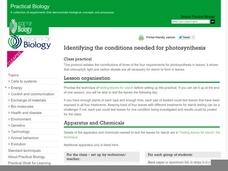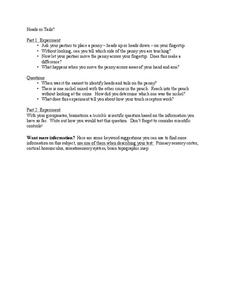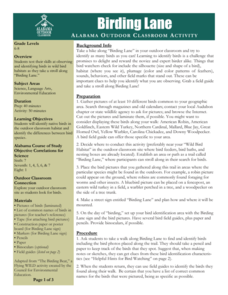American Chemical Society
Using Chemical Change to Identify an Unknown
If you discover an unknown powder, how do you determine if it is safe? Lesson uses four different tests to identify the properties of various powders that appear the same. Then scholars get an unknown powder and have to determine which...
Curated OER
Testing for Life’s Molecules
Want to hear a joke about sodium? Na. Young scientists test various materials to identify if they include protein, starch, and glucose by using the Biuret test, iodine starch test, and Benedict's test respectively. After practicing with...
Pingry School
Flame Tests
Light a fire in your pupils! Scholars conduct a flame test and observe the emission spectra of several different salts in an enlightening hands-on investigation. They use their observations to make comparisons and conclusions about the...
Teach Engineering
Flame Test: Red, Green, Blue, Violet?
Let the true colors shine through. Pupils conduct a flame test to identify an unknown element. Class members calculate and prepare specific molarity solutions of three chemicals. Using their observations of the colors emitted, they...
Scholastic
Study Jams! Identify Outcomes and Make Predictions
Making predictions and identifying possible outcomes are skills that all science pupils should possess. In this video, Mia and Sam discuss the chances of puppies being male or female as an example. The animation is adorable, and will...
American Chemical Society
Recrystallization Test
Crystallize the answer to the question that has been investigated since the first of four lessons: What is the unknown crystal? Pupils have examined, crushed, and dissolved four samples plus an unknown as an exploration of the properties...
Science 4 Inquiry
The Last Supper: Identifying Macromolecules
Why do medical examiners always state the contents of a person's stomach? Scholars learn about the importance of macromolecules through a case study of stomach contents. They perform multiple tests to determine a conclusion before they...
Curated OER
Two Beets Or Not Two Beets—What Is Your Question?
Students use the scientific method to test an idea regarding the structures of a plant as it supports the biological evidence for life. In this growing roots lesson, students use organizing sheets to record their findings. Students...
American Chemical Society
Using Dissolving to Identify an Unknown
There is a solvent called aqua regis that can dissolve gold! After observing a solubility demonstration, groups receive four known crystals and one unknown. Based on the demo, they design an experiment to determine the identity of the...
University of California
You Are What You Eat: Testing for Organic Compounds in Foods
We have all heard that we are what you eat, but what are we eating? An informative lesson opens with a discussion of the foods pupils have recently eaten. Then, young scientists perform four experiments on seven...
It's About Time
Identifying Matter
High schoolers test wood splints that have been soaked in mystery solutions to identify the different colors it produces when lit. The lesson concludes with a reading passage and analysis questions.
Teach Engineering
Rocks, Rocks, Rocks: Test, Identify Properties and Classify
Time is growing short. Teams work together to identify physical properties of rocks in order to determine the properties that would best suit their cavern shelter design.
Curated OER
Periodic Table Basics Test
The periodic table of elements is a vital tool for all chemistry apprentices and professionals alike. Here is a chance for your beginning chemists to assess their understanding of the periodic table. They list element names, symbols,...
Nuffield Foundation
Identifying the Conditions Needed for Photosynthesis
Budding biologists often ask how scientists know what they do about different topics. In the lab described here, they have a chance to find out first-hand about the requirements for photosynthesis. Three sequential investigations are...
Curated OER
Science as Inquiry: what is starch and how can we test it?
Sixth graders discuss nutrients and examine foods for starch. In this starch testing lesson, 6th graders use iodine to test foods for starch and record their results. Students complete a worksheet and self reflection.
Kenan Fellows
Using Water Chemistry as an Indicator of Stream Health
Will this water source support life? Small groups test the chemistry of the water drawn from two different sources. They then compare the collected data to acceptable levels to draw conclusions about the health of the source. The...
Howard Hughes Medical Institute
Gorongosa: Scientific Inquiry and Data Analysis
How does the scientific process begin? Introduce ecology scholars to scientific inquiry through an insightful, data-driven lesson. Partners examine data from an ongoing research study to determine the questions it answers. The resource...
Kenan Fellows
Effects of a Golf Course on Stream Health
Is the golf course causing issues in the stream? Find out with a resource that has groups perform chemical water tests to analyze the effects of a golf course on a stream. Pupils collect water above and below the course and analyze the...
Virginia Department of Education
Metals, Nonmetals, and Metalloids
How can one easily classify metals, nonmetals, and metalloids? Pupils answer this question as they experiment with unknown substances and perform tests on conductivity, brittleness, and malleability to determine...
University of Minnesota
Heads or Tails
How exactly does touch help us identify items? Learners test this question by feeling a coin without moving their fingers and trying to determine if it is heads or tails. They test their accuracy by rubbing their...
University of Texas
Matter and the Periodic Table Chemical Families and Periodic Trends
Is assembling the periodic table as simple as Tetris? Scholars arrange colored cards into a logical order and then make connections to the arrangement of the periodic table. Hands-on activities include adding trend arrows and analyzing...
LABScI
Catapult: Flight of the Marshmallows
Watch your marshmallows fly. The engaging STEM activity has groups create a catapult to launch marshmallows. After testing their prototypes, they consider improvements and redesign their catapults.
Purdue University
Healthy Water, Happy Home
Clear water does not mean clean water. A collaborative activity has groups play a board game to identify sources of water pollution and develop strategies for improving water quality. Their investigations include reference to the water...
Alabama Wildlife Federation
Birding Lane
Birdwatching is a popular hobby. Young scientists test their knowledge of bird characteristics on their own bird-watching expedition. They take their journals on a walk and sketch the key characteristics of the birds they find while...























